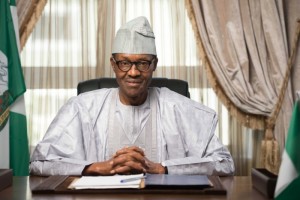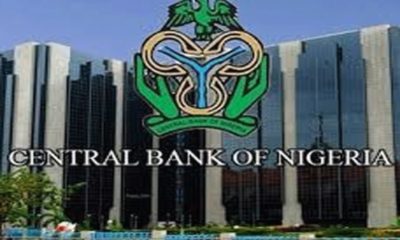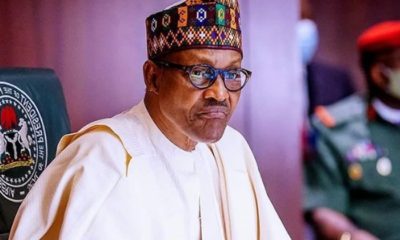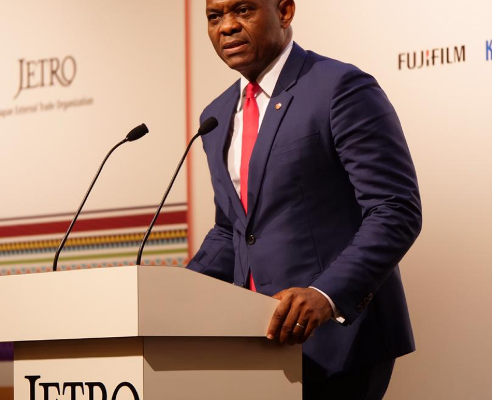Finance
TSA: President Buhari threatens severe sanctions against erring Agencies

ABUJA-FOLLOWING the Federal Governments directive to all revenue generating agencies to ensure remittances to a Treasury single account (TSA) President Muhammadu Buhari has warned all Agencies of Government that severe sanctions would be visited on all and any Agency of Government that fails to comply with the directive.
The President also warned that severe sanctions would be visited on any individual or organisation that violated his directive on the payment of all national revenues into the Federation Account.
President said that the Nigerian National Petroleum Corporation, the Nigerian Ports Authority and other MDAs which previously relied on the laws establishing them to retain all or part of the revenues collected by them, did so illegally and must now comply with the Nigerian Constitution by paying all revenues into the Federation Account.
on Tuesday said he was disappointed at the way Nigeria’s oil industry had been operated since he left office as a former petroleum minister and as a military Head of State in 1985.
Buhari said those who led the country since then had allowed the nation’s refineries to collapse in order to give their cronies the latitude to steal by importing refined petroleum products.
According to a statement by the President’s Senior Special Assistant on Media and Publicity, Garba Shehu, Buhari spoke during a meeting he had with a delegation of the Revenue Mobilisation, Allocation and Fiscal Commission at the Presidential Villa in Abuja.
Buhari blamed the past administrations for the current situation in which Nigeria is forced to spend billions of naira annually on subsidies for petroleum products.
He said the increase in petroleum subsidy payments over the years was due to the deliberate neglect of the nation’s refineries as well as oil pipelines and other infrastructure in the oil sector in order to allow the importation of petroleum products and corruption to thrive.
He said he was convinced that there would not have been any need for the huge subsidies currently being paid to importers if the development of the country’s domestic refining capacity and petroleum products distribution network had kept pace with national demand.
“They (past administrations) allowed the infrastructure to collapse so that their cronies can steal by bringing in refined products from overseas,” Shehu quoted the President as saying.
He therefore urged the chairman and members of the RMAFC, who availed him of their view on petroleum subsidy payments, to come up with more humane proposals to rescue ordinary Nigerians from what he described as the “wicked manipulation” of the country’s oil industry by corrupt operators.
Buhari was ousted in a 1985 coup led by Gen. Ibrahim Babangida, who ruled the country as a military president from in 1985, till he was forced to step aside 1993 following the uproar that greeted the annulment of that year’s presidential election, won by the late businessman, Chief Moshood Abiola.
Babangida left an Interim National Government, led by Chief Ernest Shonekan. Few months after Babangida left, the late Gen. Sani Abacha pushed aside Shonekan and ruled from that 1993 till he died on June 8, 1998.
Gen. Abdusalami Abubakar, who succeded Abacha handed over to Chief Olusegun Obasanjo in 1999 to usher in a fresh democratic dispensation in the country. Obasanjo served two terms and handed over to the late President Umaru Yar’Adua in 2007. After the death of Yar’Adua on May 5, 2010, his deputy, Goodluck Jonathan took over and led the country till May 29, 2015, when he handed over to Buhari.
Buhari was also said to have chided the RMAFC for approving what he called “excessive remunerations” for some political office holders.
He therefore urged the delegation to seek a proper interpretation of the commission’s powers and address the public outcry against the high payments.
Meanwhile, the Nigeria Labour Congress on Tuesday insisted that the Federal Government must investigate funds that were allegedly stolen during the last days of the Jonathan administration.
The NLC, at its national leadership retreat, which held in Calabar, Cross River State, also warned the new Group Managing Director of the NNPC, Dr. Emmanuel Kachikwu, not to think of removing oil subsidy.
The NLC president, Mr. Ayuba Wabba, warned that the fight against corruption by Buhari should not be trivialised.
The NLC boss lamented that the Federal Government had failed to remit N35bn to Pension Funds Administrators for workers in the last 11 years.
He said, “Another issue that we are again compelled to comment on is the ongoing campaign of President Buhari against corruption. It is of course no longer news that corruption has eaten so deep into our body polity.
“We now learnt that in the twilight of the last administration, the nation’s revenues were indiscriminately transferred to individual accounts. For us in the Congress, these funds must be recovered by all means. If we need to employ the services of forensic auditors to uncover the various amounts stashed away in foreign and domestic banks, so be it.”
He said investigations into the looting of the national treasury should not be unduly made a controversial matter.
Business
Nigeria pays US$4.9 billion on petrol subsidy in 2024- NNPCL
It was however noted by Biztellers.com.ng, that although subsidy is back in effect, the main reason for that is the increasingly weak state of the Naira and the country’s extreme dependence on products importation. Also unlike the previous subsidy era, where several oil marketers were getting free subsidy refunds for unverified product importation, this subsidy era is witnessing only one importer, the NNPCL, which in effect is the sole receiver of government subsidies.
Yemie ADEOYE
INSPITE of the official position of the Nigerian government that the controversial petrol subsidy is gone for good as announced by the President on assumption of office, the state owned Nigerian National Petroleum Corporation Limited, NNPCL has disclosed that petrol subsidy is still fully operational in Nigeria, although, under a different identity.
Umar Ajiya, Chief Financial Officer at the NNPCL, disclosed that it cost the company a staggering N7.8 trillion (US$4.9) to cover this price gap in the first seven months of 2024.
Rather than simply referring to these claims as subsidies, he stated that the company is merely managing the price difference in petrol imports on behalf of the federation, stressing that this should not be misconstrued as a return to subsidy payments.
![]() This revelation has reignited discussions on whether the NNPC is indirectly offering subsidies, a concept typically defined as selling a product below its cost price.
This revelation has reignited discussions on whether the NNPC is indirectly offering subsidies, a concept typically defined as selling a product below its cost price.
Documents reviewed by Biztellers.com.ng showed that the term “subsidy” was used extensively in official correspondence between the NNPCL and the presidency, particularly in reference to the “shortfall.”
Recall that President Bola Tinubu reportedly approved NNPC’s request to utilize the 2023 final dividends due to the federation to offset these costs.
However, during a media briefing on Monday about the company’s 2023 audited financial statements, Ajiya refuted claims that the NNPC is involved in any subsidy scheme.
Ajiya further disclosed that the Nigerian government owes the NNPC N7.8 trillion ($4.9 billion) in subsidy-related debts for the period from January to July 2024.
In furtherance of his clarification to the News Agency of Nigeria (NAN), Ajiya insisted that no subsidy payments have been made to any marketer in the last nine years, citing the NNPC’s role as the sole importer of petrol under supply contracts.
He said, “In the last eight to nine years, NNPC Ltd. has not paid anyone a dime as a subsidy; no kobo has been disbursed by NNPC Ltd. in the name of subsidy. No marketer has received any payment from us for subsidy.”
“What has been happening is that we have been importing PMS, which has been landing at a specific cost price, and the government tells us to sell it at half price. So the difference between the landing price and that half price is a shortfall.
“And the deal is between the Federation and NNPC Ltd., to reconcile, sometimes they give us money, so there is no money exchanging hands with any marketer in the name of subsidy.”
Ajiya remained silent on how much of the $4.9 billion could have been remitted to the federation account if the NNPC had not been covering the “shortfall.”
It was however noted by Biztellers.com.ng, that although subsidy is back in effect, the main reason for that is the increasingly weak state of the Naira and the country’s extreme dependence on products importation. Also unlike the previous subsidy era, where several oil marketers were getting free subsidy refunds for unverified product importation, this subsidy era is witnessing only one importer, the NNPCL, which in effect is the sole receiver of government subsidies.
Banking
CBN Denies Currency Devaluation

The Central Bank of Nigeria (CBN) has refuted claims of devaluing the.
Earlier reports suggested that the CBN had devalued the Naira, lowering its exchange rate from N631 to the dollar, compared to the previous day’s rate of N461.60 at the Importers and Exporters (I&E) window.
However, the Central Bank of Nigeria (CBN) released a statement on Thursday through its Acting Head of Corporate Communications, Dr. Isa Abdulmumin, categorizing the report as false information.
In the statement titled ‘CBN Has Not Devalued The Naira’, he said the attention of the apex bank was drawn to the news report by an Abuja based newspaper edition of June 1, 2023, titled “CB Devalues Naira To 630/51”.
However, the CBN stated categorically that the news report was replete with outright FALSEHOODS and destabilizing innuendos, ‘reflecting potentially willful ignorance of the said medium as to the workings of the Nigerian Foreign Exchange Market.’
“For the avoidance of doubt, the exchange rate at the Investors’ & Exporters (I&E) window traded this morning (June 1, 2023) at N465/USS1 and has been stable around this rate for a while.
“The public is hereby advised to ignore the news report by Daily Trust in its entirety, as it is speculative and calculated at causing panic in the market,” the CBN spokesman added.
He, therefore, advised media practitioners to verify their facts from the Central Bank of Nigeria before publishing in order not to misinform the public.
Banking
BREAKING: CBN Increases Interest Rate By 0.5%

The interest rate in Nigeria has been raised to 18.5 percent, up by 0.5 percent, from 18 percent where it was pegged in March 2023.
The Central Banks of Nigeria’s (CBN) Monetary Policy Committee (MPC) resolved to this effect at its third meeting of 2023 in Abuja, on Wednesday.
Governor, CBN, Godwin Emefiele, made the disclosure in the communiqué of the MPC’s meeting, thereafter.
While engaging the media at the end of the two-day meeting, Emefiele, said the committee voted to keep the asymmetric corridor at +100 and -700 basis points around the MPR.
In the view of the MPC, rising inflation rate is traceable to the high energy cost and challenges around the supply chain, among others, which lie outside the corridors of the CBN.
Emefiele said, “The current trend in price development would continue to be monitored by the bank with greater collaboration with fiscal authority to address the drivers of inflation.”
Biztellers reports that the CBN had effected six consecutive interest rate increases, which has seen the rate move from 11.5 percent in March 2022 to 18.5 percent in May 2023.

















